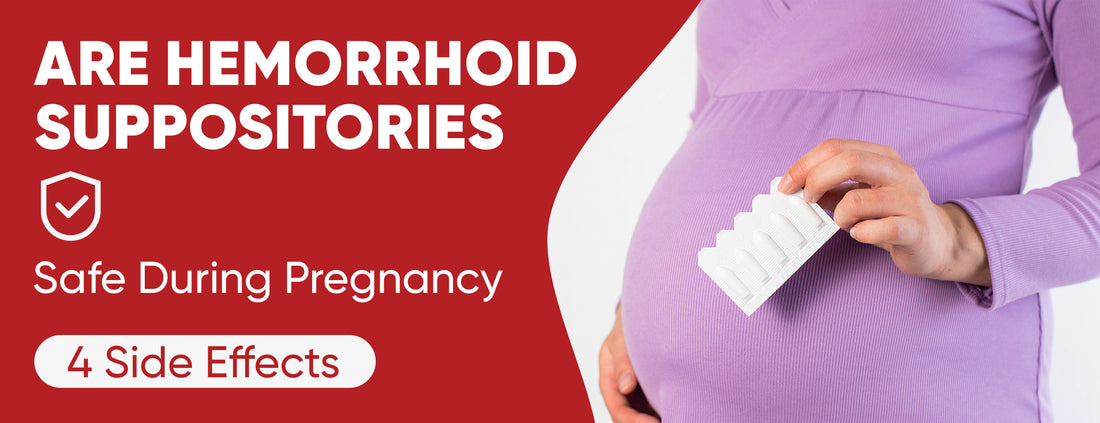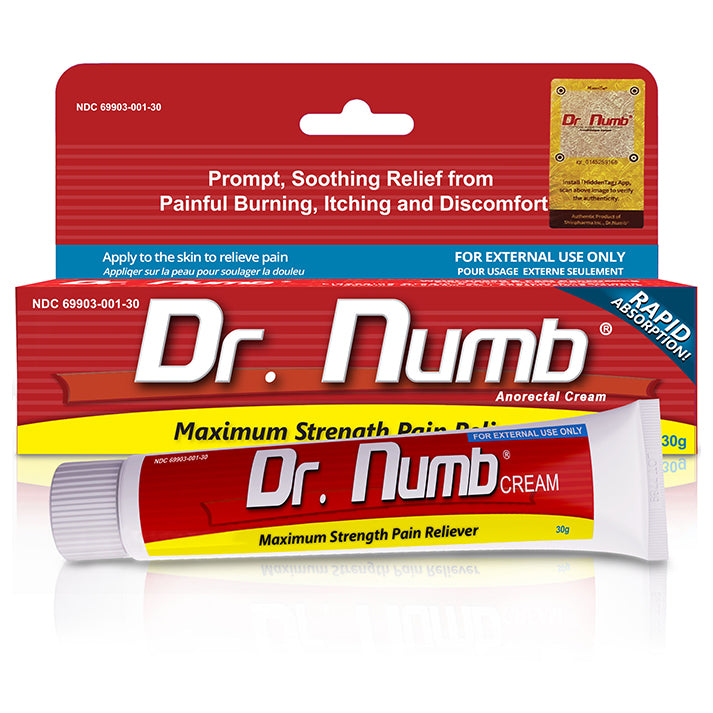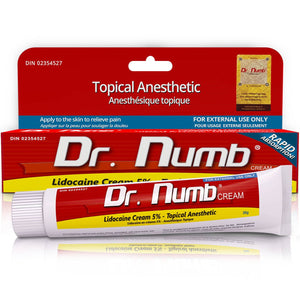Although suppositories can appear to be a viable option, the safety of using them during pregnancy is a concern. These small, bullet-shaped medications reduce inflammation, relieve pain, and promote the healing of hemorrhoids when inserted into the rectum.
Yes, Hemorrhoid suppositories should only be used during pregnancy under the guidance of a healthcare provider. They can be safe and effective for treating hemorrhoids, common during pregnancy, but risks and benefits should be carefully considered.
But before you rush to the pharmacy and buy a pack of suppositories, you should know some facts about them. This blog post will explore the risks and benefits of hemorrhoid suppositories and provide tips on making the best choices for your health and well-being.
Are Hemorrhoid Suppositories Safe During Pregnancy: 4 Side Effects

Pregnant women should weigh the benefits of hemorrhoid suppositories against any associated risks, especially when it comes to the developing fetus and mother's wellbeing. Under medical supervision, hemorrhoid suppositories are generally considered safe for use during pregnancy.
- Allergic reactions: Some women may be allergic to the active ingredients or other components of the suppositories, such as preservatives, fragrances, or dyes. This can cause itching, burning, swelling, rash, or hives in the anal area or elsewhere.
- Irritation: Some suppositories may contain ingredients that can irritate the sensitive skin of the anus and rectum, such as alcohol, menthol, or camphor. This can worsen the inflammation and discomfort of hemorrhoids.
- Infection: Inserting a suppository into the rectum can introduce bacteria or fungi into the anal canal, especially if the suppository is not sterile or the applicator is not clean. This can lead to infection of the hemorrhoids or the surrounding tissues, which can cause fever, pus, or foul-smelling discharge.
- Overuse: Using suppositories too often or for too long can cause damage to the lining of the rectum or interfere with normal bowel movements. This can result in diarrhea, constipation, or fecal incontinence. It can also reduce the effectiveness of the suppositories over time.
Possible Adverse Reactions Due To Increased Body Sensitivity
Pregnancy Sensitivity: Due to changes in their bodies, pregnant women may experience heightened sensitivity to hemorrhoid suppositories. Hormonal fluctuations can affect blood vessels, skin, and the immune system, rendering them more reactive to external stimuli.
- Increased Absorption: The augmented blood flow to the pelvic region during pregnancy can enhance medication absorption into the bloodstream. This heightened absorption may impact other organs or systems in the body.
- Consultation with Healthcare Provider: Pregnant women should consult their healthcare provider before using any hemorrhoid medication during pregnancy. Following the instructions on the label and adhering strictly to the recommended dosage and duration is essential.
- Monitoring and Action: Pregnant women should discontinue the use of suppositories and seek medical attention if they experience any signs of allergic reactions, irritation, infection, or overuse.

Impact of Hemorrhoid Suppositories on the Developing Fetus
- Limited Evidence: There is scant evidence regarding the effects of hemorrhoid suppositories on the developing fetus during pregnancy. Most research has centered on topical creams or ointments rather than suppositories.
- Placental Transfer: Some experts suggest that certain ingredients in hemorrhoid suppositories may traverse the placenta and reach the fetus. However, conclusive data on this matter remain limited.
Some of these ingredients are:
- Steroids: Some suppositories contain corticosteroids, such as hydrocortisone or prednisolone, which are anti-inflammatory agents that reduce swelling and itching. However, high doses or prolonged use of steroids during pregnancy may increase the risk of low birth weight, cleft palate, or adrenal insufficiency in the newborn.
- Anesthetics: Some suppositories contain local anesthetics, such as lidocaine or benzocaine, which numb the pain receptors in the anal area. However, these agents may also affect the heart rate or blood pressure of both the mother and the fetus if absorbed into the bloodstream.
- Vasoconstrictors: Some suppositories contain vasoconstrictors, such as phenylephrine or ephedrine, which constrict the blood vessels and reduce bleeding. However, if absorbed into the bloodstream, these agents may raise the mother's and fetus's blood pressure or heart rate.
Benefits of Using Hemorrhoid Suppositories During Pregnancy
Hemorrhoid suppositories are useful for treating the risks and side effects of hemorrhoids, but they also have some benefits that can make them a preferable option for some pregnant women. Hemorrhoid suppositories can positively relieve symptoms, ease use and convenience, and reduce surgery and other invasive treatments.
Positive Effects Of Hemorrhoid Suppositories

Hemorrhoid suppositories deliver medication directly to the affected area, which can help reduce inflammation and promote healing. The medication is absorbed into the bloodstream through the rectal wall, allowing it to reach the hemorrhoids quickly and effectively.
Some of the medications that can be found in hemorrhoid suppositories are:
- Anti-inflammatory agents: include prednisolone and hydrocortisone, which can reduce swelling and itching. They can also help prevent infection and scarring of the hemorrhoids.
- Anesthetic agents: include lidocaine or benzocaine, which can reduce pain in the anal region. They can provide temporary relief from pain and discomfort caused by hemorrhoids.
- Astringent agents: include witch hazel or zinc oxide, which can reduce bleeding by constricting the blood vessels. They can also help dry out and shrink the hemorrhoids.
Ease Of Use & Convenience Compared To Other Treatment Options
- Simple Application: Hemorrhoid suppositories offer ease of use, allowing for quick and discreet insertion.
- Fast Relief: They provide rapid and effective relief from hemorrhoid symptoms without the need for frequent application or reapplication.
- Flexible Usage: Hemorrhoid suppositories can be utilized anytime, including at night, without disrupting daily activities or sleep patterns.
Comparison with Other Treatments
- Mess-Free Application: Unlike creams, ointments, pads, or wipes, which can be messy, sticky, or uncomfortable, suppositories offer a clean and hassle-free application method.
- Avoids Skin Irritation: Topical treatments may irritate the skin or stain clothing/bedding, while suppositories dissolve internally, bypassing these issues.
- Minimally Invasive: Hemorrhoid suppositories are a non-intrusive treatment option, contrasting with surgical interventions, which can be painful and entail risks such as bleeding, infection, or complications.
- Potential for Avoiding Surgery: By reducing hemorrhoid severity and frequency, suppositories may mitigate the need for or delay surgical interventions, offering a less invasive alternative.
- Preparation for Surgery: Suppositories can help prepare the anal area for surgery by minimizing inflammation and infection, potentially enhancing surgical outcomes.
- Beneficial for Pregnant Women: Hemorrhoid suppositories represent a valuable treatment option for pregnant women, offering symptom relief, improved quality of life, and the potential to circumvent more invasive procedures.
Considerations Before Using Hemorrhoid Suppositories
Hemorrhoid suppositories may have some benefits for treating hemorrhoids during pregnancy, but they are not suitable for everyone. Pregnant women should consider some factors before using hemorrhoid suppositories, such as consulting a healthcare provider, discussing potential alternatives, and safety considerations.

Importance Of Consulting A Healthcare Provider
Pregnant women should always seek medical advice before taking medications during pregnancy, including hemorrhoid suppositories. This is because some medications may have harmful effects on the mother or the fetus or may interact with other medications or supplements.
Some of the questions that pregnant women should ask their healthcare provider before using hemorrhoid suppositories are:
- What are the benefits and risks involved in using hemorrhoid suppositories while pregnant?
- What are the active ingredients and other components of the suppositories?
- How often and how long should I use the suppositories?
- What are the possible side effects or complications of using the suppositories?
- How should I store and dispose of the suppositories?
- What should I do if I have allergies, irritations, infections, or overuse from using the suppositories?
- Should I avoid any other medications or supplements while using the suppositories?
Pregnant women should follow their healthcare provider’s advice when using hemorrhoid suppositories. They should also report any changes in their symptoms or any adverse reactions to their provider.
Discussion Of Potential Alternatives To Hemorrhoid Suppositories
Hemorrhoid suppositories are not the only option for treating hemorrhoids during pregnancy. Pregnant women may also discuss with their healthcare provider about potential alternatives to hemorrhoid suppositories, such as:
- Lifestyle changes: These include eating a high-fiber diet, drinking plenty of fluids, avoiding straining during bowel movements, exercising regularly, and avoiding prolonged sitting or standing. These changes can help prevent or reduce constipation, which can worsen hemorrhoids. They can also improve blood circulation and reduce pressure on the pelvic area.
- Home remedies: include applying ice packs, witch hazel pads, or aloe vera gel to the anal area to relieve pain and swelling. They also include soaking in a warm or sitz bath (a basin that fits over the toilet) to soothe and cleanse the anal area. These remedies can provide temporary relief from mild to moderate symptoms of hemorrhoids.
- Other medications: topical creams, ointments, pads, or wipes that contain ingredients such as hydrocortisone, lidocaine, or zinc oxide. These medications can be applied to external hemorrhoids to reduce inflammation and pain. Additionally, they can prevent infection and bleeding. However, they may not be effective for internal hemorrhoids or severe cases of hemorrhoids.
Pregnant women should weigh the pros and cons of each alternative with their healthcare provider and choose the one that suits their needs and preferences.
Safety for Pregnant Women with Pre-Existing Medical Conditions

A pregnant woman with a pre-existing medical condition may need extra precautions when using hemorrhoid suppositories. Some of these conditions are:
- Diabetes: Pregnant women with diabetes may have an increased risk of infection from using hemorrhoid suppositories. They should monitor their blood sugar levels and check their anal area for signs of infection regularly.
- High blood pressure: Pregnant women with high blood pressure are more likely to experience complications from using hemorrhoid suppositories that contain vasoconstrictor ingredients like phenylephrine. These agents can increase the mother and fetus's blood pressure and heart rate.
- Heart disease: Pregnant women with heart disease are more likely to have complications when using hemorrhoid suppositories containing a local anesthetic. These agents can hurt both the mother's and the fetus's heart rate or blood pressure.
Pregnant women with these or other medical conditions should consult their doctor before using hemorrhoid suppositories. Providers should also be informed of any other medications they are taking to avoid potential interactions or complications.
Hemorrhoid suppositories are a treatment option that can help some pregnant women cope with hemorrhoids. However, they are not without risks and limitations. Pregnant women should consult a doctor before taking hemorrhoid suppositories, discuss potential alternatives, and consider safety factors.
Types of Hemorrhoid Suppositories
There are several types of hemorrhoid suppositories available on the market. The type of suppository that will work best for you depends on the severity of your hemorrhoids and your preference.
Here are the most common types of hemorrhoid suppositories and their active ingredients:
- Hydrocortisone Suppositories - contain hydrocortisone, a steroid that helps reduce inflammation and pain.
- Witch Hazel Suppositories - contain witch hazel, an astringent that helps reduce swelling and inflammation.
- Vitamin E Suppositories - contain vitamin E, an antioxidant that helps promote healing and reduce inflammation.
- Anesthetic Suppositories - contain lidocaine or benzocaine, which are local anesthetics that help relieve pain.
Regardless of the type of active ingredient used in hemorrhoid suppositories, they all work similarly to provide relief from symptoms.
How Do Hemorrhoid Suppositories Work to Relieve Symptoms?
Suppositories for hemorrhoids are designed to deliver active ingredients directly to the affected area for precise relief. Once inserted into the rectum, the suppository dissolves and spreads medication throughout the anus, allowing the active ingredients to reach inflamed tissues and alleviate symptoms like pain, itching, and inflammation.
Prevent Tips for Hemorrhoids During Pregnancy
Preventing hemorrhoids during pregnancy involves adopting good habits and making lifestyle changes. While it’s not always possible to completely avoid hemorrhoids, these strategies can help reduce your chances of developing them:
- High-Fiber Diet: Eat plenty of fiber-rich foods. Fruits, vegetables, whole grains, and legumes can help prevent constipation, a common contributor to hemorrhoids.
- Stay Hydrated: Drink an adequate amount of fluids each day. Proper hydration helps maintain regular bowel movements and prevents constipation.
- Avoid Prolonged Sitting: Sitting for long periods puts pressure on the veins in the anus and rectum. Take frequent breaks to walk around or shift positions.
- Warm Water Soaks: Soak in a tub filled with warm water (without soap or bubble bath). This can help soothe discomfort and reduce inflammation.
- Use Witch Hazel: Apply witch hazel medicated pads to the anal area. These can provide relief from itching and inflammation.
- Kegel Exercises: Perform Kegel exercises regularly during pregnancy. These exercises improve circulation to the perineal area and may help prevent hemorrhoids.

Treatment Tips for pregnancy hemorrhoids
Treating hemorrhoids during pregnancy involves several strategies to alleviate discomfort and promote healing. Here are some effective approaches:
Soak in Warm Water: Take warm baths or soak in a tub filled with warm water. Avoid using soap or bubble baths in the water. This can help soothe the affected area and reduce inflammation.
Avoid Prolonged Sitting: Sitting for extended periods puts pressure on the veins in the anus and rectum. Stand up, move around, and take frequent breaks. Consider using a hemorrhoid pillow (a ring cushion or doughnut) for added comfort.
Over-the-Counter Remedies
- Apply witch hazel medicated pads to the anal area. These can provide relief from itching and inflammation.
- Consult a healthcare provider to recommend a safe hemorrhoid cream or rectal suppository specifically suitable for use during pregnancy.
Address Constipation
Constipation contributes to hemorrhoids during pregnancy. To prevent or relieve constipation:
- Include high-fiber foods (such as fruits and vegetables) in your diet.
- Ask your healthcare provider to recommend a safe fiber supplement for pregnancy.
- Stay hydrated and drink plenty of fluids.
- Include physical activity in your daily routine.
Sitz Baths
Taking warm sitz baths can provide soothing relief for hemorrhoid discomfort. Soaking in a shallow tub of warm water for about 10 to 15 minutes several times a day can help reduce swelling and irritation.
Conclusion:
In conclusion, hemorrhoid suppositories can be a convenient and effective way to treat hemorrhoids fast and efficiently, including during pregnancy. They can provide immediate relief from pain, itching, and inflammation and reduce the need for more invasive procedures.
However, it is crucial to remember that pregnancy is a unique and delicate time, so any medication or treatment should be carefully considered and its safety evaluated.
We highly recommend consulting a doctor before taking any medication, including hemorrhoid suppositories during pregnancy, to ensure that your health and the health of your developing fetus remain safe and healthy.




















